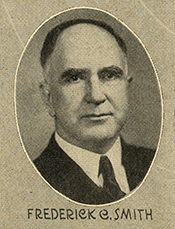| This article needs additional citations for verification. Please help improve this article by adding citations to reliable sources. Unsourced material may be challenged and removed. Find sources: "Frederick Cleveland Smith" – news · newspapers · books · scholar · JSTOR (October 2012) (Learn how and when to remove this message) |
| Frederick Cleveland Smith | |
|---|---|
 | |
| Member of the U.S. House of Representatives from Ohio's 8th district | |
| In office January 3, 1939 – January 3, 1951 | |
| Preceded by | Thomas B. Fletcher |
| Succeeded by | Jackson Edward Betts |
| Personal details | |
| Born | (1884-07-29)July 29, 1884 Shanesville, Ohio, US |
| Died | July 16, 1956(1956-07-16) (aged 71) Marion, Ohio, US |
| Resting place | Marion Cemetery |
| Political party | Republican |
| Alma mater | A.T. Still University |
| Occupation | Osteopathic physician |
Frederick Cleveland Smith (July 29, 1884 – July 16, 1956) was an American physician and politician who served six terms as a Republican member of the U.S. House of Representatives from Ohio from 1939 to 1951.
Early life and career
Frederick C. Smith was born in Shanesville, Ohio. He pursued higher education in osteopathic medicine in Kirksville, Missouri, and practiced there for several years. He then traveled overseas to continue his study of medicine in Frankfurt, Germany, and in Vienna, Austria.
In 1917, Smith was licensed to practice medicine and surgery in the State of Ohio and opened his practice in Marion, Ohio. He also served as mayor in Marion, Ohio from January 1936 until January 1, 1939, when he resigned.
Smith founded the Frederick C. Smith Clinic in Marion, which brought together doctors in various fields in a practice that benefited from each doctor's specialty. The original clinic was located on East Church Street. The concern continues in Marion, Ohio, and still bears Smith's name.
Tenure in Congress
Smith was elected as a Republican to the Seventy-sixth and to the five succeeding Congresses. He supported $7 billion in aid to Britain, Lend-Lease, and the 1941 amendment to the Neutrality Act to remove restrictions that forbade U.S. vessels from entering combat zones and US citizens from sailing on vessels of belligerents.
He also denounced "isolationism" and took a staunchly "pro-British" position in between the "fall of France" in the summer of 1940 and the Nazi invasion of the Soviet Union in the summer of 1941, during which time Great Britain was essentially alone. He frequently spoke in favor of aiding Britain.
During the early 1950s, Smith "would invariably draw 'zero' ratings from the Americans for Democratic Action and other leftist groups." One of the most conservative members of Congress between 1937 and 1970, he has been labeled by some writers as the sixth most conservative overall since 1937.
He was not a candidate for renomination in 1950.
Later years, death and interment
Smith resumed his medical profession. He died in Marion, Ohio, on July 16, 1956, and was interred in the Marion Cemetery.
Sources
- United States Congress. "Frederick Cleveland Smith (id: S000536)". Biographical Directory of the United States Congress.
- The Political Graveyard
References
- Rothbard, Murray. Life in the Old Right, Chronicles (1994)
- Is John Kerry A Liberal? (accessed January 20, 2012)
| U.S. House of Representatives | ||
|---|---|---|
| Preceded byThomas B. Fletcher | Member of the U.S. House of Representatives from Ohio's 8th congressional district 1939 - 1951 |
Succeeded byJackson E. Betts |
| Members of the U.S. House of Representatives from Ohio's 8th congressional district | ||
|---|---|---|
 | ||
- 1884 births
- 1956 deaths
- People from Tuscarawas County, Ohio
- People from Marion, Ohio
- Physicians from Ohio
- American osteopathic physicians
- A. T. Still University alumni
- Mayors of places in Ohio
- Republican Party members of the United States House of Representatives from Ohio
- 20th-century members of the United States House of Representatives